Wagner: Lohengrin (Nagano)
Introduction
A live performance from the Festspielhaus, Baden-Baden, filmed over three nights in June 2006.
King Heinrich of Brabant addreses his people, and attempts to persuade them to come with him to fight the Hungarians in the East. The people though, are in the middle of a feud themselves and so an explanation is sought from Friedrich of Telramund.
He explains that he was given charge of the children of the previous Duke of Brabant, Elsa and Gottfried, but that one day, Elsa lost Gottfried in a wood and he wasn`t seen again. He accuese her of killing her brother so she can take power herself, with the lover he believes she has. He renounces any right he had to marry her, choosing another, Ortrud, instead.
Heinrich decides Elsa must stand trial. Elsa described how she prayed after losing her brother and suddenly falls into a trance, only coming out of it when Heinrich demands she defends herself. She explains that she has just had a vision of a knight, who Telramund insists must be her lover. Telramund insists on a fight to the death to rescue the King`s honour, which Heinrich agrees to, but Elsa has no champion apart from the knight in the vision. She says that he will come to defend her.
The knight is summoned, but does not appear until after a second call. He arrives on a swan, and causes a little bit of a stir amongst the people watching. He approaches Heinrich and confirms that he will champion Elsa, and if victorious, marry her. Elsa agrees, but the knight makes her promise never to ask where he has come from, or who he is.
Telramund refuses to back down, despite the obvious mystical nature of the knight. One rule is stipulated - noone must use any magic to gain an advantage. They fight, and Telramund is beaten, but is spared. Ortrud is beginning to wonder who has ruined her plans for power, and Telramund is thoroughly humiliated
Telramund and Ortrud blame each other for his defeat and their failure in grabbing the power they both need. Ortrud insnists that if the knight can be tricked into revealing who he relly is, then he will lose his power and can be defeated. The only one who can find out is Elsa, and if even if that fails, Telramund could ambush the kight and wound him, which she says would destroy any magical protection he may have.
Ortrud tricks Elsa into believing Telramund and herself need forgiveness (after praying to her own Gods for revenge). She is invited to Elsa`s wedding the following day, but Ortrud tries to convince her that the knight isn`t to be trusted. Telramund has been listening, and decides to kill the kinght the first chance he gets.
The King announces that Telramund and his followers have been banished and that the knight is now ruler of Brabant. The knight promises to lead the troops against the Hungarians following his wedding. Telramund is kept hidden by some friends and vows to accuse the knight of treachery.
The wedding procession is interrupted by Ortrud`s sudden apparent reversal of support for Elsa. She insists that the knight reveals his true identity, as what she believes was hers has been forcefully taken away from her, and she wants everyone to know who was responsible. Elsa is unmoved and remains thoroughly supportive of her future husband, and his right to secrecy. The knight protects Elsa, but Telramund appears and accuses him of using some form of magic to beat him. He also demands to know who the knight is, but the King and his supporters won`t have any of it. Telramund then tries to persuade Elsa that even if the knight were slightly wounded then his secret would be out, and that`s exactly what she really wants....isn`t it? The knight says that the only person who could learn anything about him is Elsa, and asks here again whether she really does need to ask. Elsa is beginning to turn.
Elsa and the knight are by themselves for the first time. As they reveal their innermost feelings, Elsa asks him who he really is. The knight tells Elsa that it doesn`t matter, and the only thing she needs to know is that he loves her, and that he came from the happiest place imaginable just to be with her. This upsets her, as she know thinks that he will eventually want to go back to wherever it is he came from. She demands to know who he is, despite everything the knight says.
Telramund bursts in and attacks the knight but is killed quickly. The knight orders that the body, and Elsa, be taken to the King. This is done, and the knight tells everyone that he is no longer going to fight for them. He asks whether he was right to kill Telramund and then reveals that Elsa has gone back on her promise. Because of this, despite that fact that she was tricked, he has to leave, but not before revealing that he is Lohengrin, one of the guardians of the Holy Grail, and that the King of the grail`s castle is his own father, Parsifal. The Grail gave him special powers in acts of chivalry, but only if his identity remained a secret.
The swan returns to take Lohengrin home. Lohengrin is deeply upset by this, as the swan is actually Gottfried, Elsa`s brother, and he was to have been returned, in human form, to his family after a year.
Ortrud is delighted by this news, as it was actually her who turned Gottfried into a Swan. Her spiteful mocking isn`t lost on Parsifal (or the Grail) however, and Gottfried is returned after all to be the new leader before Lohengrin leaves forever.
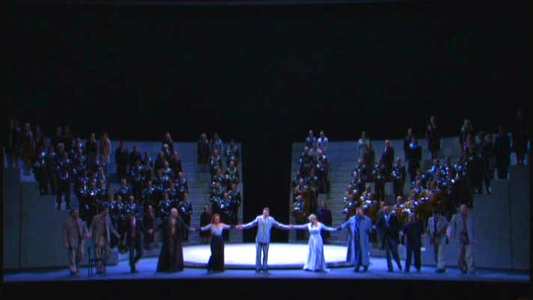
Video
Again, this Opus-Arte production is presented in NTSC - Anamorphic 16:9. The video quality is very fine indeed, and as with their recent `Lady Macbeth` , reveals the highly detailed and subtle stage lighting to great effect.
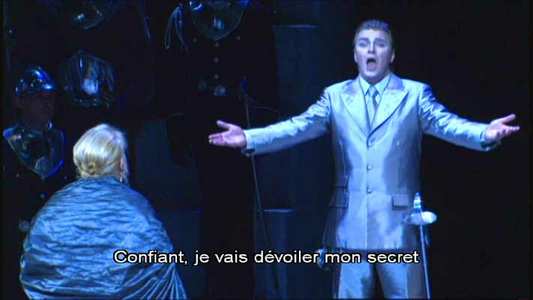
Audio
The DTS (and LPCM stereo) sound is also excellent, although I sometimes felt that it was all set at a slightly muted level, meaning I had to turn the volume up quite substantially to get the full effect of the music when it was at full throttle. Balance, overall is also very good.
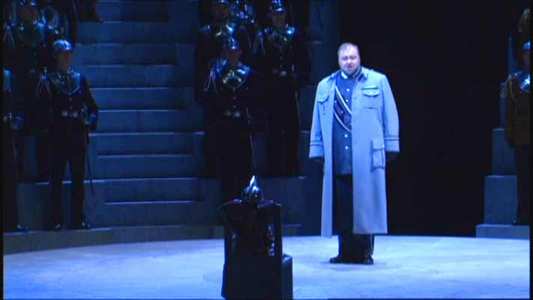
Features
The main extra is another substantial film, Never Shalt Thou Ask of Me`, by Reiner E. Moritz, in which the main contributors to the production (and a few minor ones) give a detailed and quite fascinating insight into how everything was put together. This is certainly one of the better Moritz documentaries which often accompany Opus-Arte releases.
Moritz and Nikolaus Lehnhoff (the director) also provide a couple of interesting short essays for the accompanying booklet.
The usual multitude of subtitles are provided.
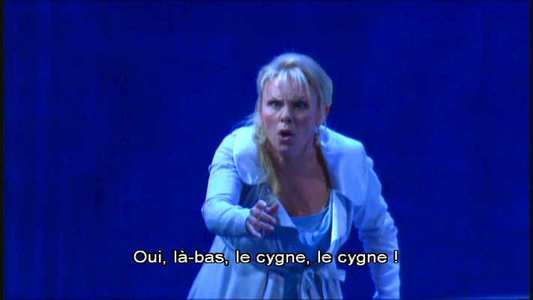
Conclusion
Coming between `Tannhaüser` and `Tristan`, Lohengrin was a great leap forward in many ways for Wagner, not least in his development of the orchestral writing. Luckily, the Deutsches Symphonie Orchester Berlin is a fine band, and plays consistently well, sounding gorgeous throughout, although things would have been better if Nagano had whipped them up into more of a frenzy in, for example, the third act Prelude.
This is a minor point though, as he generally creates plenty of time for the music to breathe and phrases things excellently.
The staging from Lehnhoff (together with his collaborators) is very impressive, using huge ranges of `stone` steps in various ways, and lighting which changes with almost every mood the music produces. If there is anything to grumble about, it is the costumes, which seem to be from a variety of historical periods, and there is more than a hint of 1940`s militarism in some of the chorus`s outfits (creating a slightly uneasy feeling in Heinrich`s great rallying cry to create a better Germany by battling everyone who seems to threaten it). Lohengrin`s armour has also been converted into what appears to be a silver lounge-singer suit (together with silver hair) and this produces a (probably not intended) comedy moment when he is seen `composing` the famous wedding march at a grand piano at the beginning of Act 3.
I`m also quite pleased that a lot is left to the imagination (the music helps), most obviously in that we see no Swan, rather a shaft of light between the steps. At the very least, this prevents any mechanical failure of pathetic motorised birds ruining things, as it did once in a production, when it apparently moved so fast for that particular Lohengin at the end of the opera (the Czech tenor, Leo Slezak) that he missed it completely. He turned to the stage crew and asked when the next swan was leaving.
The best thing about this though is the singing, which is of course very fortuitous, this being an opera review. Each of the solo performers has a very distinctive voice, not always a hugely beautiful voice in some cases, but this makes the ensemble passages great fun to listen to. Instead of turning into some amorphous mass of lovely Wagnerian harmonies, we can actually hear each vocal line quite distinctly, even on top of the full orchestra (again, a major achievement by the recording engineers).
Klaus Florian Vogt (Lohengrin) appears to have quite a soft voice, probably more suited to Mozartian roles, but he never really out of his depth in this repertoire, and pitches some of the more awkward moments quite naturally. He also leaves plenty of energy for the final act where he belts things out, but without any straining.
Solveig Kringelborn (Elsa) has a very striking and expressive face, which is a bonus for several of the close-up shots we have of her (in what seems to be a permanent trance). Her singing too, is highly expressive, despite missing what I felt to be some necessary depth.
Hans-Peter König (Heinrich) and Tom Fox (Telramund) are both very impressive (although König more so) with confident performances. It certainly helps to have these two at the bottom of the pile in the ensembles.
The highlight though, has to be Waltraud Meier`s superb Ortrud. Looking like a cross between Kate Bush and Cruella de Ville, she has the sort of stage-presence most singers would kill for, and lasts the marathon that is this opera to produce one of the most frightening `Damn you all to Hell!` moments I`ve ever heard (in a good way of course).
Since first hearing this piece almost 30 years ago, I`ve always sat on the fence when deciding if it`s something I really like or not. This DVD makes an excellent case for an opera which should really be better known for more than the one or two `famous bits`.
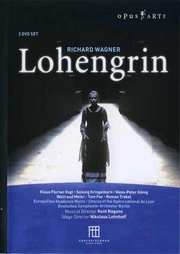
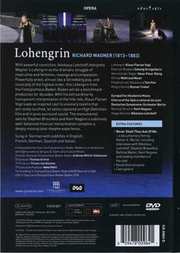




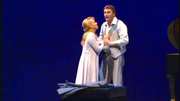
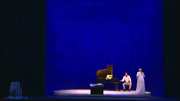
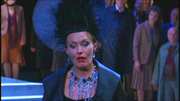
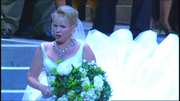
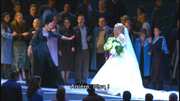
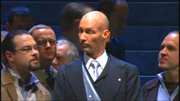
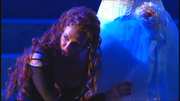
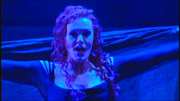
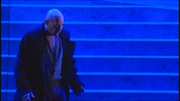
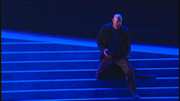
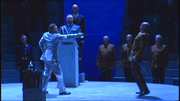
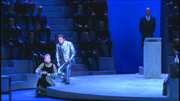
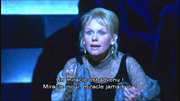
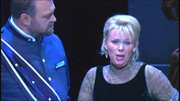
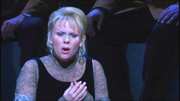
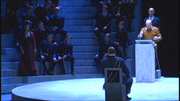
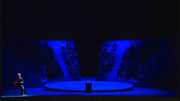
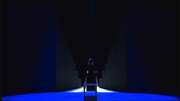































Your Opinions and Comments
Be the first to post a comment!